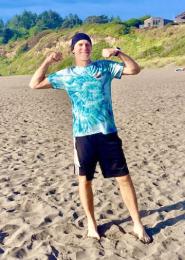With Mishka Straka, Integrated Nutritionist
Getting older is no joke. Why are some of us healthy and vigorous, while others struggle to get out of bed every day and constantly battle multiple health issues? Most ailments we face upon aging have a major dietary component to them. This class presents an overview of diet and lifestyle practices that contribute to health and longevity.
Recent statistics tell us that the average child born in the U.S. is projected to take prescription drugs for more than 40 years of their life. More than 85 percent of seniors take pharmaceuticals, and a majority take five or more! There are, on average, 19 prescriptions filled every year for every person in the U.S. -- a trend that has dramatically increased over the decades. Yet the U.S. is in an ever complicated, increasingly expensive health crisis, with no end in sight. Rates of loneliness and depression have never been higher.
The established way of dealing with disease is to simply take a pill, but there are often side affects, they can be expensive, and it creates a dependency upon "Big Pharma" to provide the remedy. But this may not always be necessary.
Did you know that many leading causes of death are due to diet and lifestyle choices, and many can be ameliorated via subtle or radical changes in your behavior? Living longer and being healthier isn’t as much genetics, as it is lifestyle outcomes.
Diseases common to the U.S. were virtually unknown in the cultures of tribal people and those communities in the so-called "Blue Zones." Diabetes, heart disease, dementia, obesity, and hypertension have their root causes in our diets.
Making better choices can be confusing, though. There are so many influencers on social media who want to convince you to go all in with their platform. It's hard to know what to do, when so much of the information out there is contradictory.
It's important to know that diseases don’t just suddenly appear out of nowhere, and that we aren’t purely victims of random genetic injustice. For example, dementia can be fostered through diet and lifestyle choices that we have patterned over a lifetime. The same can be said for build-up of arterial plaque, hypertension, and obesity. It is possible to have more control of your health, and that making changes to your diet (going more plant-based) can have dramatic effects upon your health and well being.
Many of us have wondered: How much protein should I eat? Is a keto diet a good option? Can I become a vegan? Is wine really good for me? What about coffee? Should I cut back on carbohydrates? Is a vegetarian diet healthy? Is all fat good or bad for me? How much should I walk? How much exercise do I need? What is vo2 max, and why is it important? We will look at how we can approach some of these questions.
The instructor has been recently influenced by Dr. Michael Gregor, author of How Not to Die, and How Not to Diet, two excellent books you are encouraged to read. You can also go to nutritionfacts.org for links to all of the research that backs up this information.
Register by October 2.
Mon., Oct. 7 & 14 • 6-7:30 p.m.
In person: Arcata
$35 • Class #: 44121

Mishka Straka
For over two decades Mishka Straka studied various Chinese internal martial arts, including 10 years with Martin Werner, martial arts scholar and instructor. Mishka is also the founder of the Humboldt Permaculture Guild and the annual seed and plant exchange. A former lecturer at HSU, Mishka has worked as a solar professional. He has worked to create bio-preserves in Chile, worked in sustainable forestry, and explored temperate rain forests throughout the world, co-created the community park in Garberville, and has done market gardening. Intellectually multidimensional, he has an undergraduate degree in economics, completed a premedical program for naturopathic medicine, and a graduate degree in environmental systems.





